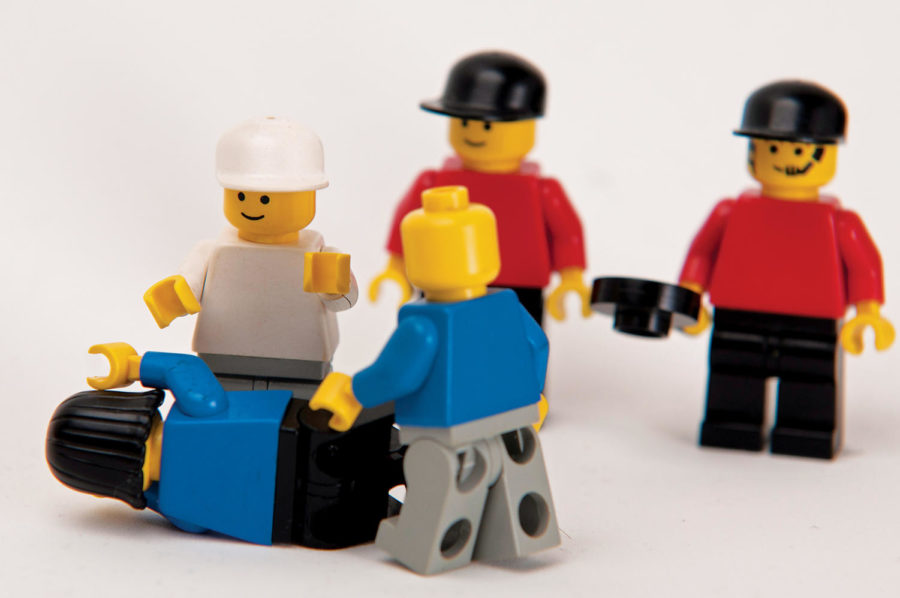Barefoot: Staying silent won’t stop violence
Photo illustration: Logan Gaedke/Iowa State Daily
Columnist Barefoot believes bystanders have a duty to act during attacks. Without intervention she believes violent acts of discrimination and hate crimes will continue.
April 24, 2011
At a Baltimore McDonalds on April 18, a young transgendered woman was beaten by two females while the employees of the restaurant watched, gave words of encouragement, and videotaped the beating. It was put on both Facebook and YouTube before it was taken down.
In the video, as onlookers cheer and insult the victim, only one man yells to stop the beating. Still, the beating continues to the point where the woman begins to have a seizure. Her attackers then leave the scene, worried that police will soon arrive. While it is unclear from the video, articles about the attack say the employees let the aggressors leave.
A 14-year-old girl has been charged as a juvenile in connection with the assault, and charges are still pending against an 18-year-old woman in relation to the crime. According to news articles, the beating occurred because the woman was talking to one of the aggressors’ “man.” Apart from the employee who taped the beating, none of the employees who witnessed the attack have been fired.
Firing only the employee who did the taping sends the message that the employee was fired not for taping the attack, but for making McDonalds look bad. Why were the other employees not fired. Wasn’t their behavior just as bad? What message does it send that people who cheered on a beating are allowed to stay? Their actions do not promote the idea that McDonalds is “committed to doing the right thing. And we’ve got the policies, programs and practices in place that allow us to use our size and scope to help make a difference,” as their website states.
When I worked in fast food during high school, we were told to follow the handbook, which tells employees to contact the police in the case of events in which a potentially dangerous situation occurs. I am guessing McDonalds has a similar policy to follow. It is not like these employees did not know what to do; they chose to do the wrong thing. Even if they didn’t read the handbook, it is common sense to call the police in a situation like the one that occurred.
All of these employees could have done something. They could have told the aggressors to stop. They could have called the police. But instead, they stood there and watched. Some even cheered on, all while the attack was videotaped. It could have been as simple as picking up the phone and calling 911. Instead, an employee used a cell phone to tape the crime not for evidence, but for laughs on YouTube. Why do people think that people getting beaten up is funny, rather than a serious crime?
How can we live in a society in which we choose not to act, or assume someone else will act for us? Forty seven years after Kitty Genovese was murdered in New York, screaming for help while her neighbors did nothing, we still have the bystander effect. We have the capability to stop things like this from happening, but for whatever reason, we do not.
While there are some good Samaritans in the world, too many stories of people standing by while girls get gang-raped, students get bullied in school, and hate crimes are committed, make me think that good Samaritans are the minority.
I am grateful to the people who did stand up against the attack, but it is painful to realize that people still do not speak up and help those in trouble. Even more troubling is the fact that people applaud and laugh at the fact that a person is being beaten up. Regardless of whether the woman is transsexual, straight, white, black — no one deserves to be beaten up while others stand by laughing.
As decent human beings, we have an moral duty to help out. Even if we are too scared to put ourselves in the middle of a fight, we still need to call the police, or get someone in charge to help. We need to have the power to say, “stop it,” and use it frequently. Standing by silently will not make the problem magically go away.
Some might look at this, and think, “this is just one instance, usually people help out.” But how many times have we all stood by and watched someone get bullied or get made fun of?
An American Justice Department study showed that 1 out of every 4 students will be bullied by another student. While it is not as horrible as watching someone get beat up, it’s still harassment, and we still have the power to stop it from happening. The FBI’s list of hate crime statistics shows, in 2009, there were 6,604 incidences of hate crimes in the United States. These are just a couple of the many statistics showing how prevalent hate and cruelty is in America.
We can’t watch silently. We have to speak up and say, “stop.” Otherwise, it will continue to occur. We need to put down the video cameras and call the police.







